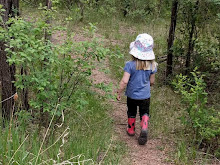Sometimes the world feels distressingly small, without new places to be discovered, crowded with people. Perhaps part of that comes from growing up in such an urban society, or being inundated with the urban experience through the media. We move so quickly about that all sense of a journey evaporates. We are here and then we are there, completely missing the in between.
The missing journey occurs the most with flying, but can happen in cars, too. We focus on the road, on getting there quickly, confined to major highways that whiz by everything. The journey is there, but shadowed somehow, everything overlooked.
The thing that I discovered I loved about trains is the speed of the journey, the route it takes. Since I'm not driving, I have time to look around, to consider. The route is important too. Roads evolve, their routes change. Towns that were once busy stops are bypassed, forgotten, left to decay. Rail lines can't change so easily, don't have a reason to change, and one is left to confront the reality of these forgotten places.
It can be sad, in a way. Businesses long gone, factories closed. A cemetery with low walls of adobe, slowly crumbling away. Roads largely empty, save for a lone local traveler. Places that call out for me to stop and remember them.
The tracks run through places once discovered and then forgotten. Eyes witness these places, but very few feet tread there. A beach that hasn't been touched in a very long time. No trace of human footprints. Very rare in a place like California, during the summer. Another beach, surrounded by cliffs, seemingly impossibly to access, and yet there is evidence remaining, a fort built out of driftwood.
Secret places, little pockets of habitation. A lone person doesn't even glance up as we pass. A whole family sits on a lawn, waving as we race by. A little girl on a beach waves to the train. I wave back, knowing she can't see me, but feel some connection to the person who waved at the entity containing me.
In some ways, it can be a bit frustrating. I'm bound to the train and its stops. Places requiring further exploration need a separate journey back - perhaps a trip by car. From here, all I can do is watch those places disappear behind me.
Part of me wants to travel more of this country by train. I've only done so in one other country, but my guess is that there are not so many forgotten places along the tracks in other parts of the world. It took the freeways and fast cars and the desire for instant gratification in reaching a destination to create those places.Sometimes the world feels distressingly small, without new places to be discovered, crowded with people. Perhaps part of that comes from growing up in such an urban society, or being inundated with the urban experience through the media. We move so quickly about that all sense of a journey evaporates. We are here and then we are there, completely missing the in between.
The missing journey occurs the most with flying, but can happen in cars, too. We focus on the road, on getting there quickly, confined to major highways that whiz by everything. The journey is there, but shadowed somehow, everything overlooked.
The thing that I discovered I loved about trains is the speed of the journey, the route it takes. Since I'm not driving, I have time to look around, to consider. The route is important too. Roads evolve, their routes change. Towns that were once busy stops are bypassed, forgotten, left to decay. Rail lines can't change so easily, don't have a reason to change, and one is left to confront the reality of these forgotten places.
It can be sad, in a way. Businesses long gone, factories closed. A cemetery with low walls of adobe, slowly crumbling away. Roads largely empty, save for a lone local traveler. Places that call out for me to stop and remember them.
The tracks run through places once discovered and then forgotten. Eyes witness these places, but very few feet tread there. A beach that hasn't been touched in a very long time. No trace of human footprints. Very rare in a place like California, during the summer. Another beach, surrounded by cliffs, seemingly impossible to access, and yet there is evidence remaining: a fort built out of driftwood.
Secret places, little pockets of habitation. A lone person doesn't even glance up as we pass. A whole family sits on a lawn, waving as we race by. A little girl on a beach waves to the train. I wave back, knowing she can't see me, but feel some connection to the person who waved at the entity containing me.
In some ways, it can be a bit frustrating. I'm bound to the train and its stops. Places requiring further exploration need a separate journey back - perhaps a trip by car. From here, all I can do is watch those places disappear behind me.
Part of me wants to travel more of this country by train. I've only done so in one other country, but my guess is that there are not so many forgotten places along the tracks in other parts of the world. It took the freeways and fast cars and the desire for instant gratification in reaching a destination to create those places.


